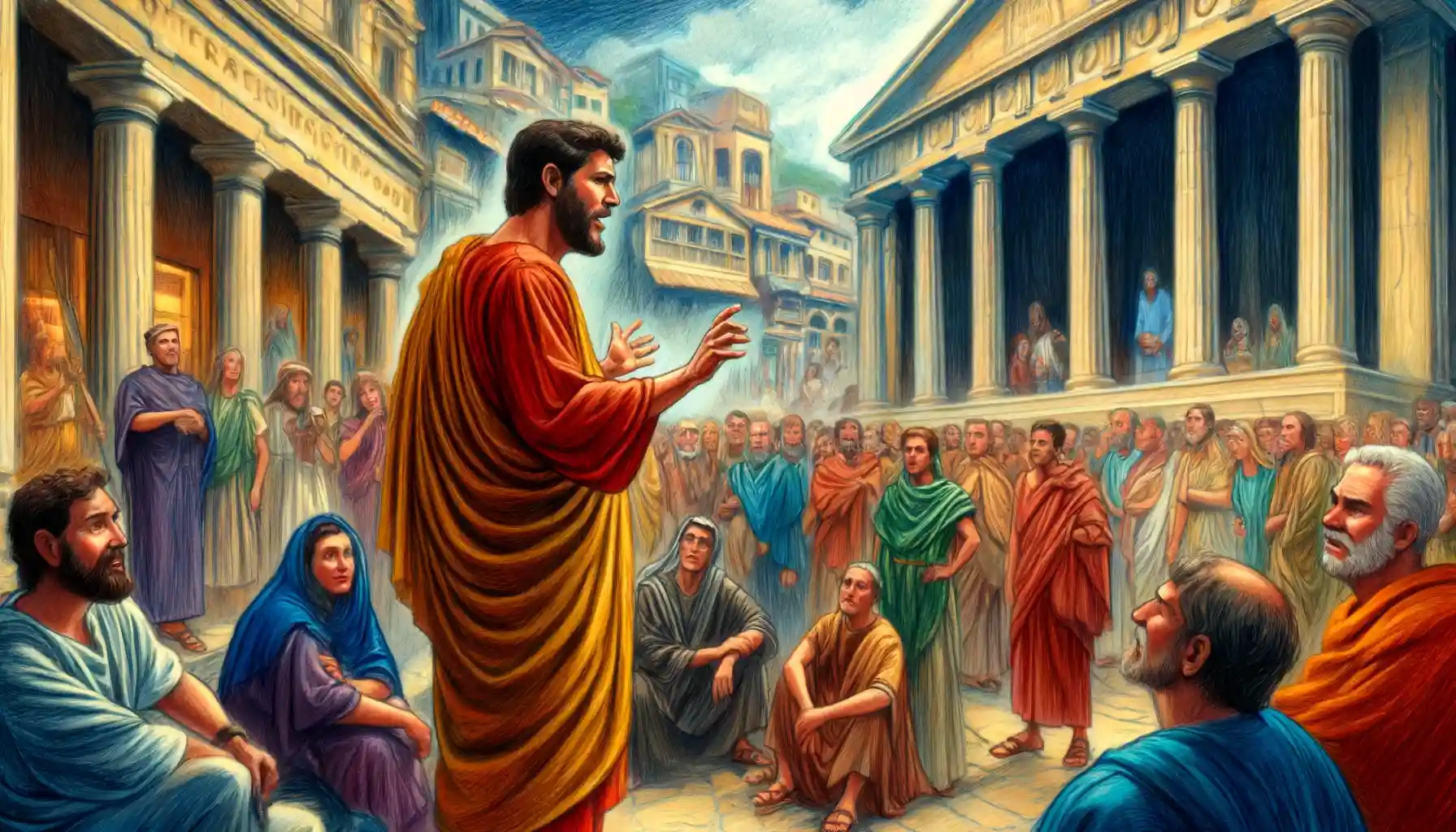
The Book of 1 Corinthians
The Book of 1 Corinthians is a key epistle in the New Testament, written by the Apostle Paul to address the Christian community in Corinth. Here are some quick facts about the Book of 1 Corinthians:
- Authorship: Traditionally attributed to Paul the Apostle, along with Sosthenes, who is mentioned as a co-author in the opening verse.
- Date of Writing: Likely written around 53-54 AD during Paul’s stay in Ephesus, part of his third missionary journey.
- Audience: Directed to the church in Corinth, a cosmopolitan city in Greece known for its cultural diversity and moral laxity. The Christian community there was facing various theological and ethical challenges.
- Purpose: Paul wrote to correct improprieties and to resolve theological and practical issues within the Corinthian church, including divisions, immorality, disputes over spiritual gifts, and misunderstandings concerning the resurrection.
- Themes:
- Unity and Division: Paul addresses the factions and divisions within the church, advocating for unity and love among believers.
- Spiritual Maturity: The epistle tackles issues related to spiritual immaturity and encourages growth in Christian conduct.
- Christian Conduct: Offers guidelines on a variety of issues such as marriage, Christian liberty, worship practices, and the proper use of spiritual gifts.
- Resurrection: Paul provides a profound doctrinal treatment of the resurrection of Christ and its implications for Christian faith and practice.
- Structure: The letter is organized around the various issues faced by the Corinthian church, with Paul responding systematically to reports and questions he had received.
- Key Passages:
- 1 Corinthians 13: Known as the “Love Chapter,” it provides a poetic description of Christian love and its importance above all spiritual gifts.
- 1 Corinthians 15: Discusses the resurrection of Christ and the future resurrection of believers, emphasizing the gospel’s foundational aspects.
- Literary Features: 1 Corinthians is noted for its rhetorical skill, including argumentation, diatribe, and a sophisticated use of Greek rhetorical forms, which Paul employs to address complex issues effectively.
The Book of 1 Corinthians, one of the Apostle Paul’s most insightful letters, addresses the complex issues faced by the early Christian community in Corinth. This epistle combines doctrinal instruction and practical advice, reflecting the challenges of maintaining Christian integrity in a cosmopolitan and morally lax environment. Here is a detailed analysis of 1 Corinthians, exploring its context, structure, themes, and significant teachings.
1. Historical Context
Paul wrote 1 Corinthians around 53-54 AD from Ephesus during his third missionary journey. Corinth was a major Greek city renowned for its wealth, cultural diversity, and notorious immorality. The Christian community there was relatively young and grappling with issues stemming from its surrounding culture, including intellectual pride, factionalism, and ethical misconduct.
2. Structure
The structure of 1 Corinthians is primarily issue-based, with Paul addressing specific problems reported to him by members of the community or relayed by Chloe’s household:
- Introduction (1:1-9): Paul introduces himself and gives thanks for the Corinthian believers, setting a positive tone before addressing their issues.
- Divisions in the Church (1:10-4:21): Paul tackles the issue of factions within the church, criticizing the Corinthians for their allegiance to different leaders rather than to Christ.
- Moral and Ethical Issues (5:1-6:20): This section addresses various moral failings within the community, including sexual immorality and lawsuits among believers.
- Questions about Marriage and Food Sacrificed to Idols (7:1-11:1): Paul responds to specific questions from the Corinthians regarding marriage, singleness, and eating food offered to idols.
- Worship and Spiritual Gifts (11:2-14:40): Issues concerning proper conduct during worship, the role of women, and the use and abuse of spiritual gifts, especially speaking in tongues, are discussed.
- The Resurrection (15:1-58): Paul provides a detailed doctrinal exposition on the resurrection of Christ and its implications for Christians.
- Conclusion and Final Greetings (16:1-24): Includes instructions on the collection for Jerusalem, final exhortations, and personal greetings.
3. Major Themes
- Christian Unity: Paul emphasizes unity over division, urging the Corinthians to avoid sectarianism and to focus on their shared faith in Christ.
- Spiritual Maturity: The letter addresses issues arising from spiritual immaturity, such as arrogance, jealousy, and strife, urging growth in understanding and behavior.
- Moral Integrity: Paul insists on high ethical standards, particularly concerning sexual morality, as essential for the Christian life.
- The Primacy of Love: 1 Corinthians 13 underscores that love is the greatest Christian virtue, superior to all spiritual gifts.
- The Importance of Sound Doctrine: Particularly in chapter 15, Paul stresses the centrality of the resurrection to Christian faith, linking doctrinal correctness to ethical conduct.
4. Theological Significance
1 Corinthians offers a rich theological and practical framework for understanding how Christians are to conduct themselves individually and as a community. It blends practical advice with profound theological insights, particularly concerning the resurrection and the nature of the Christian body—both Christ’s body and the body of believers.
5. Contemporary Relevance
The issues Paul addresses in 1 Corinthians are remarkably contemporary, dealing with church unity, cultural engagement, sexual ethics, and spiritual gifts. It remains a crucial resource for churches navigating the complexities of faithfulness in diverse and often secular environments.
In summary, 1 Corinthians provides essential guidance for maintaining community integrity, promoting spiritual maturity, and living out the implications of the gospel in everyday life. Its teachings are as relevant today as they were in the first century, offering vital insights for nurturing robust Christian communities.



